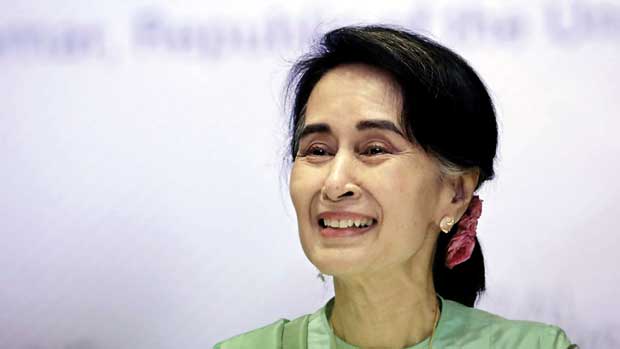Reply To:
Name - Reply Comment
Last Updated : 2024-04-19 00:03:00
 Narratives of horror in Myanmar’s restive Rakhine State and the squalid refugee camps in Bangladesh where nearly 400,000 Rohingya refugees live in subhuman condition after being chased out by the Burmese Army’s scorched earth campaign are distressing. Ethnic violence in Rakhine first erupted soon after Myanmar’s military junta relaxed its grip on political power in 2012. A social media post by rubble-rousing monk Ashin Wirathu about an alleged rape of a Buddhist woman by two Muslim youth precipitated an orgy of ethnic violence that engulfed the Rohingyas. Since then the community has been confined in military guarded internment camps, with no right of movement.
Narratives of horror in Myanmar’s restive Rakhine State and the squalid refugee camps in Bangladesh where nearly 400,000 Rohingya refugees live in subhuman condition after being chased out by the Burmese Army’s scorched earth campaign are distressing. Ethnic violence in Rakhine first erupted soon after Myanmar’s military junta relaxed its grip on political power in 2012. A social media post by rubble-rousing monk Ashin Wirathu about an alleged rape of a Buddhist woman by two Muslim youth precipitated an orgy of ethnic violence that engulfed the Rohingyas. Since then the community has been confined in military guarded internment camps, with no right of movement.
Myanmar’s military dictator Ne Win disenfranchised Rohingyas in 1982 under the new citizenship laws, effectively turning them into the world’s largest community of stateless people, with no recourse to jobs, education, healthcare and even to birth certificates. The latest military crackdown was launched after a series of simultaneous attacks by Rohingya militants who have recently been waging a low level insurgency. Now media reports indicate a heavy dose of radicalization in the refugee camps, with a disturbing potential of a local grievance being exploited by the global jihad.
On the surface, the problem has always been that most these states failed to accommodate the full scope of their demographic diversity
What is equally distressing is a pattern of events that have been witnessed in many parts of the world whenever a new country or one that had been under jackboots of an autocrat finally tried to define its own identity. Few new states emerged unscathed in their nation-building process; many were cannibalized by their own domestic forces. South Sudan, the world’s newest state was engulfed in a power struggle that pitted two main tribes (Dinka and Nuer) against each other and produced the first famine in the 21st century. Earlier, the Balkans fragmented into an ethnic inferno along the ethnic lines of former Yugoslavia’s many communities. Africa’s story of building inclusive nation states is abyssmal. Even where it managed to avoid the mass slaughter of Rwanda, Burundi, and Democratic Republic Congo, primary loyalties of the people were firmly placed with their tribe and the clan. At the British departure from the Subcontinent, India was born in the butchery of partition. Bangladesh followed suit two decades later. 
On the surface, the problem has always been that most of these states failed to accommodate the full scope of their demographic diversity. While that is true to some, it is still only a partial explanation. The dynamics of competing interests and the national imperatives sometimes make the two irreconcilable. America’s founding fathers were willing to grant slave owning Southern states an effective veto through the electoral college, but India’s first prime minister Jawaharlal Nehru viewed extensive devolution demanded by Pakistan’s founder Ali Jinnah for Muslim provinces were inimical to India’s national interest -- in terms of both national security and the central planned economy that India adopted.
Those prejudices were perhaps in great deal inherent in the Burmese Buddhist discourse and also helped by an earlier Rohingya insurgency to secede from Myanmar to join Pakistan at its independence
Though there are plenty of leaders who have bungled the affairs of their nations, there are many others who were overpowered by virulent domestic factors, some of which they themselves helped unleash while others predated their political existence. Ms Aung San Suu Kyi, the Nobel laureate is a hostage of those competing ethnic interests that were unleashed long before she got her own freedom (and by any account, real power of the state is still with the generals). Those prejudices were perhaps in great deal inherent in the Burmese Buddhist discourse and also helped by an earlier Rohingya insurgency to secede from Myanmar to join Pakistan at its independence.
It is naive to assume that the leaders do not care for the cost of mismanagement of competing ethnic interests. If Jinnah did not anticipate the mass mayhem, he helped unleash, Ms Suu Kyi had first hand witnessed this regular pattern of slaughter happening elsewhere. However, virulence of those domestic forces is such that few leaders manage to rise above them.
In the 1960’s, Samuel Huntington, writing about the failure in democratization in newly independent former colonies, observed a gap between the slow pace of building political institutions and the accelerated rate of enhanced political participation and social mobilization. “The primary problem of politics is the lag in the development of political institutions behind social and economic change,” he wrote. That political gap left the nascent political institutions and politics in general at the mercy of ‘ethnic bidding’, militant trade unionists, insurgents and coup d’etat.
This problem is understandable though. It took Britain 400 years since the Magna Carta to implement the universal suffrage. In the subcontinent, those were implemented barely fifty years ago before any form of serious political reforms were tried. And our part of the world was (and is) unparalleled not only in demographic diversity but also in inequality of social conditions. ‘Equality of conditions’ had to be built. It is a far more complicated and often conflictual process than giving every man a vote.
Our politics thus quite predictably became hostage of a myriad ethnic forces. Sri Lanka’s gradual political decay since independence has much to do with that political gap, which became increasingly wide as the UNP itself split with S.W.R.D Bandaranaike’s parting of ways to form the SLFP. With two main political parties vying for the majority Sinhalese vote, ethnic bidding became the political strategy. The upsurge of Sinhala Buddhist nationalism which was kicked into action by political calculations could not be abated once unleashed.

Add comment
Comments will be edited (grammar, spelling and slang) and authorized at the discretion of Daily Mirror online. The website also has the right not to publish selected comments.
Reply To:
Name - Reply Comment
On March 26, a couple arriving from Thailand was arrested with 88 live animal
According to villagers from Naula-Moragolla out of 105 families 80 can afford
Is the situation in Sri Lanka so grim that locals harbour hope that they coul
A recent post on social media revealed that three purple-faced langurs near t

10 Apr 2024
09 Apr 2024